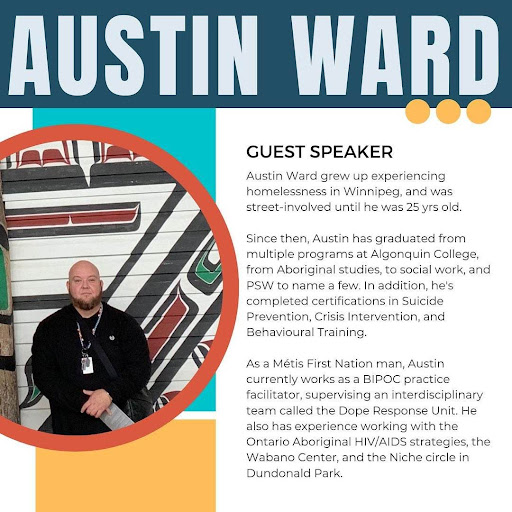Important: The GCConnex decommission will not affect GCCollab or GCWiki. Thank you and happy collaborating!
Indigenous Awareness Workshop featuring Austin Ward
About the event
The Materiel Group Diversity and Inclusion Office is pleased to present its first in-person L1 Working Group event, and you’re invited!
We will host an Indigenous Awareness Workshop featuring keynote speaker Austin Ward - a Métis First Nations man from Manitoba and residential school survivor who was raised by his Mohawk father. His father taught him how to hunt, fish, and set up trap lines while emphasizing the importance of honouring the animals that gave their lives to feed their families and community.
Austin will guide and teach us how to make smudge kits and their significance, followed by a Q&A session facilitated by the Diversity and Inclusion Office Section Head, Samantha Moonsammy. Each participant will receive a smudge kit.
More About Keynote Speaker Austin Ward
Austin Ward is a Métis First Nations man from Manitoba who was raised by his Mohawk father. His father taught him how to hunt, fish, and set up trap lines while emphasizing the importance of honouring the animals that gave their lives to feed their families and community. However, when Austin went away to residential school for two years, he returned to find that his father no longer wanted to teach him the traditional ways. This caused Austin to resent his Indigenous culture and eventually led him to become street-involved in Winnipeg.
Despite his troubled past, Austin decided to make a better life for himself and his son by moving to Ontario and attending Algonquin College. He successfully graduated from multiple programs, including General Arts & Science, Social Work, PSW, and Aboriginal study Victimology, Autism, and Behaviour studies. He also obtained many certificates in Suicide Prevention, Crisis Intervention, and Behavioural Training. As a Métis First Nations man, Austin currently works as a BIPOC practice facilitator and supervises an interdisciplinary team called the Dope Response Unit. He also facilitates a Niche circle in Dundonald Park and has given talks on how to break the street life cycle.
The Significance of Smudge Kits
Austin reconnected with his teachings and culture by getting involved with his knowledge keepers and now carries a Bundle with pride. He teaches about the four traditional medicines - Sage, Tobacco, Sweetgrass, and Cedar - and how they are used in smudge kits. He emphasizes the importance of handling these medicines with good intentions and making smudge kits with good thoughts. Despite his troubled past, Austin has become a role model in his community and is helping others to reconnect with their culture and teachings.
Sage, tobacco, sweet grass, and cedar are the four traditional medicines used in smudging ceremonies. Each of these medicines has unique properties and purposes.
- Sage is commonly used for cleansing negative energy and purifying a space or person. It has a strong, distinct aroma that can help clear the mind and promote mental clarity. Sage is often used at the beginning of a smudging ceremony.
- Tobacco is a sacred plant used for offering prayers and thanks to the spirits. It is often offered in gratitude for the gifts of the earth and for protection during spiritual ceremonies. Tobacco can be smoked or offered in a pipe during smudging.
- Sweetgrass is a fragrant grass that is burned as a purifying agent to attract positive energy. It is commonly used to create a welcoming and peaceful atmosphere, and its sweet scent is believed to invite positive energy and spirits.
- Cedar is used to purify the mind and body, and to help restore balance and harmony. It is often used in healing ceremonies and is believed to have powerful cleansing and protective properties.
When creating smudge kits with these medicines, it's important to handle them with respect and care. The intentions behind the smudging ceremony should be pure and positive, and the smoke from the burning medicines should be used to cleanse and purify the space or person.


